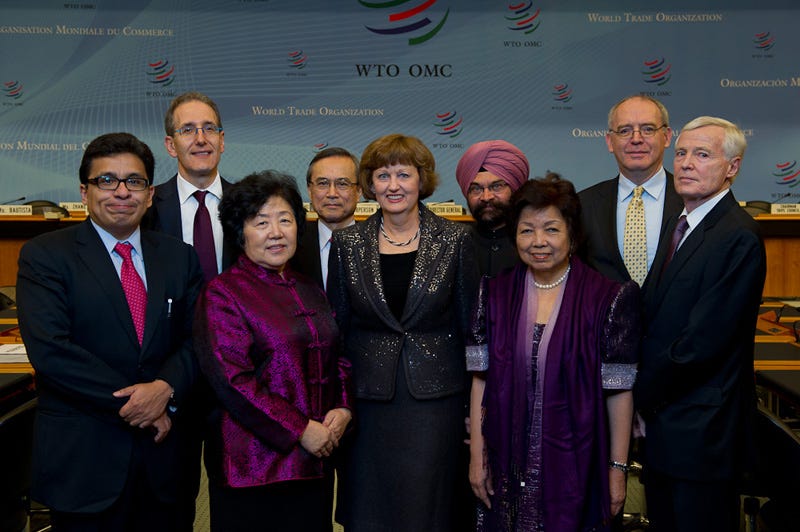The Gap in the Biden Return to Multilateralism
In the run-up to the 2020 election, the Biden campaign promised repeatedly to restore United States international leadership, including by engaging with international organizations and alliances. And nearly a year into the administration, a great deal has been accomplished. A non-exhaustive list in no particular order:
Rescinding the Trump administration’s withdrawal from the World Health Organization and unfreezing U.S. funds owed to the organization.
Ending the Trump administration’s boycott of the UN Human Rights Council and then securing election to a seat on the body.
Rejoining the Paris Agreement and actively participating in the ongoing climate change negotiations in Glasgow.
Lifting sanctions that had been imposed on top International Criminal Court officials as punishment for the ICC’s investigation of U.S. conduct in Afghanistan.
Reassuring NATO allies about the importance of the alliance and describing its collective defense provisions as “sacred.”
There is one notable gap in the general story of revived U.S. multilateralism, however, and it centers on what was perhaps the Trump administration’s most consequential attack on the global architecture: the disabling of the World Trade Organization’s Appellate Body.
Effectively a standing international trade court, the Appellate Body is designed to issue binding rulings on disputes over trade rules between WTO members. The mechanism was created in 1995 as a key feature of the WTO, and it was viewed as a major upgrade from the voluntary and nonbinding dispute system used under the GATT regime (for a good primers on the Appellate Body, see this analysis by Chad Bown and Soumaya Keynes and this one by Simon Lester).
After a slow start, the Appellate Body became an active part of the WTO’s efforts to resolve trade disputes and ensure compliance with international rules. It appeared that one of the most notable additions to the world’s multilateral architecture had settled into place.
Then came the crisis. Shortly after assuming office, the Trump administration blocked the appointment of new Appellate Body members, citing several concerns about the body’s jurisprudence. As the serving members reached the end of their appointed terms, the body shrank in membership until it was no longer able to perform its functions. The last member’s term expired in late 2020, and the body has now ceased to operate.
Almost a year into the Biden administration, the standoff over WTO dispute resolution continues. The United States has not relented by allowing new appointments, and the Appellate Body remains frozen. Panels of trade experts convened by the WTO can still consider trade disputes, but without a functioning Appellate Body those disputes cannot be resolved definitively. To the frustration of key allies, Biden administration officials have been vague about what precise reforms they seek as a condition for allowing the appointment of new members.
The delay in reviving the Appellate Body is driving to distraction some free-trade advocates. Writing in The Hill recently, Gregory Shaffer and Henry Gao made the case that U.S. economic interests demand restarting the system. They pointed, in particular, to a recent WTO panel ruling that certain Chinese trade practices violate international rules:
Without the Appellate Body…China was able to appeal the decision “into the void,” turning the hard-won U.S. victory into an unadopted panel report, having little value. Since the U.S. is planning WTO challenges to China’s subsidies regime and its use of state-owned enterprises, it is crucial to restore binding WTO dispute settlement.
At a minimum, the Biden administration should signal that it is ready to actively engage in clarifications of the WTO Dispute Settlement Understanding as a condition for reinstating binding dispute settlement. Such a move would help to repair Washington’s battered reputation that was sadly tarnished during the Trump era.
The Biden administration is clearly not convinced by that reasoning. And the administration’s hesitancy is a reminder that concern about the WTO’s jurisprudence and the overreach of the Appellate Body predates the Trump administration and crosses partisan lines. The Biden team may well be calculating that the economic costs of what it considers misguided WTO jurisprudence outweigh those associated with a dysfunctional dispute resolution system.
Whatever the merits of that calculation, the Appellate Body crisis also points to a deeper and more fundamental question about U.S. willingness to accept binding international rulings.
For several decades and across administrations, the United States has become increasingly averse to international courts and keen to avoid legal exposure. In the 1980s, the United States withdrew its (already conditional) acceptance of compulsory jurisdiction at the International Court of Justice. It was the Reagan administration that pulled the plug (in the context of the case brought by Nicaragua), but no Democratic administrations have sought to revive ICJ jurisdiction nor does there appear to be any meaningful Congressional support for such a move. The Trump administration took the decoupling from the ICJ several steps further, and it appears very unlikely that those decisions will be reversed.
When it comes to international criminal justice, both Republican and Democratic administrations have opposed International Criminal Court investigations of U.S. conduct (as well as that of U.S. allies such as Israel). They have differed significantly when it comes to tone and tactics toward the ICC, but there is a stable bipartisan rejection of The Hague’s right to investigate U.S. personnel.
In this context of deep aversion to international legal scrutiny, the U.S. willingness to accept binding decisions from the WTO was always something of an outlier. It survived in Washington, it seems to me, because the conservatives that guard U.S. sovereignty most jealously viewed the WTO’s substantive goal of liberalizing trade as advantageous (and conservative in orientation).
The Trump administration’s jaundiced view of international trade finally extended to the WTO the longstanding conservative hostility to international institutions and judges. And thus far, the Biden administration is showing how difficult it is to push against that broader trend—and why even some supporters of multilateralism may not particularly want to.


